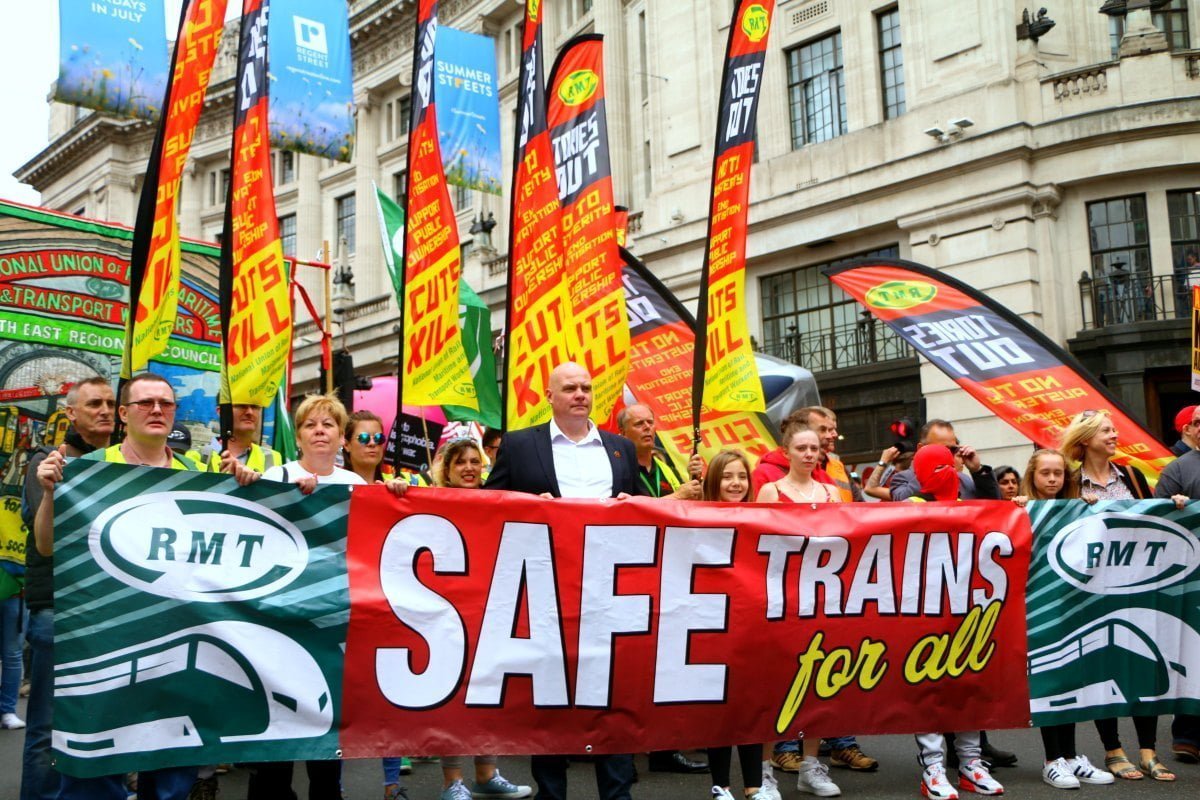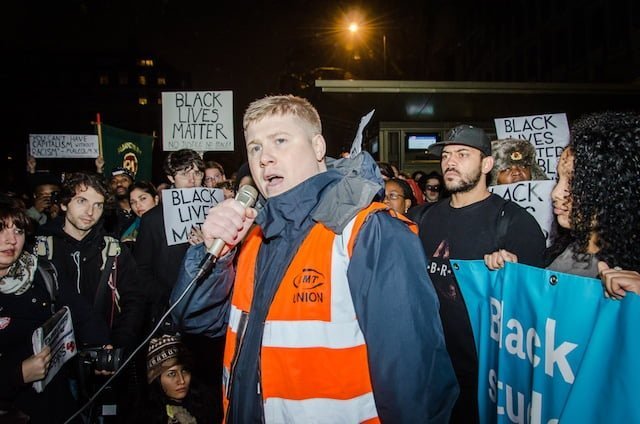The sectarianism of a few, says Eddie Dempsey, is standing in the way of the RMT union joining the fight for a Corbyn government.
Socialist Appeal recently caught up with Eddie Dempsey, a member of the RMT NEC, to ask him about the debate inside the union over re-affiliation to the Labour Party. Speaking in a personal capacity, this is what he had to say.
Following a call from Jeremy Corbyn and John McDonnell for the RMT to re-affiliate to Labour and support the socialist gains made in the party and in wider society, our 2016 AGM instructed us (the NEC) to seek direct responses from the Labour Party on a series of questions raised in the 2016 AGM debate.
We received a response from Ian Lavery MP on those questions. Our executive then took a decision to:
1) instruct all our branches and regional councils to hold special meetings for the purpose of considering the document from Ian Lavery and to provide our executive with formal responses as to whether we should affiliate or not to Labour;
And 2) to convene a Special General Meeting (SGM) on 30th May in Doncaster to make a decision. We have called a SGM rather than an AGM because we felt it would be more in line with the spirit of the previous AGM and, under our rule book, would also involve the same delegates who provided us with the questions they believed our members needed answers to prior to making a decision.
Our current political strategy is to support the socialist leadership of the Labour Party under Jeremy; to “deepen and defend the socialist gains made in Labour and in society in general’; and to support candidates who support Jeremy.
So we are currently in the consultation phase prior to our SGM where branches are meeting. Sharp debate is taking place and resolutions are being sent to our executive on the question of affiliation.
Two campaigns have been formed as a result. One is for affiliation: the RMT Campaign for Affiliation to Labour. This was founded at a meeting in Preston following formal invites to every branch and council. This campaign has unaligned members, Labour Party members, CPB members, former Socialist Party members, and some old Militant members active in it.
The campaign against affiliation seems to have been founded on Facebook and is called the Campaign to Defend RMT Political Strategy. This campaign is supported, though not formally, by the Socialist Party, Socialist Workers Party, unaligned members and also a prominent soft-left activist.
History and heritage
 My personal view is that which advanced workers and socialists in their unions came to recognise over 100 years ago: that the gains we make in the workplace are temporary, and that we need working class representation in parliament to make those gains permanent.
My personal view is that which advanced workers and socialists in their unions came to recognise over 100 years ago: that the gains we make in the workplace are temporary, and that we need working class representation in parliament to make those gains permanent.
This is even more particular to my union, which draws its heritage from the railway unions that founded industrial trade unionism in Britain (the NUR) and indeed played a leading role in the formation of the Labour Party (ASRS).
As far back as Nov 25th 1898, a leading article in the Railway Review wrote:
“The very existence of trade unions is at the mercy of political action. Political action can render trade unionism powerless, or it could make it all powerful. Political action could solve the labour problem for ever, or it could make the labourer a slave in name and in fact. Political action could give us all that we shout for from the trade union platform or it could damn our movement for years to come.”
It was our member, Thomas Steels from ASRS Doncaster Branch, who moved the famous motion to go to the TUC to:
“…invite the cooperation of all the cooperative, socialistic, trade union and other working organisations … for securing the return of an increased number of Labour members in the next parliament.”
This was moved at the 1899 TUC in Plymouth by John Holmes, ASRS regional organiser for my own region.
We draw our political pedigree from the railway syndicalists, inspired by James Connolly, in our industrial methods, and from the socialists and pioneers who led a trade union movement (kicking and screaming in some cases) into founding a mass party of labour.
Industrial unity is our economic weapon, and a mass class party founded on our industrial organisation is our political weapon.
TUSC’s failure
I have lived my whole life under neoliberalism, red and blue. When the RMT was expelled from Labour for supporting socialist candidates in Scotland, I was of the belief that the Labour Party was a dead end and that no socialist force backed by the mass of our class could take back power in Labour. I was clearly wrong.
Yet in these past years, despite being expelled from our own party, we never as a union abandoned our historic industrial and political principles. We remain steadfast in our objective of achieving industrial unity against sectionalism. And we never abandoned the principle that a mass party of our class is needed to take political power for the reasons stated above.
The TUSC project was supposed to see the trade unions in the TUC follow the RMT into partnership with the Socialist Party and Socialist Workers Party – just as our forebears did in forming a mass party rooted in the trade unions capable of taking state power.
That didn’t happen. Despite the Socialist Party having strong representation on the executives of other trade unions, they didn’t join us. Last year the SWP withdrew. The political impact has been a failure, with TUSC candidates being beaten in elections by Mr. Baked Beans and the Beer, Baccy and Crumpet party.
Politically TUSC is finished. The rise of Corbyn and the mass swing to Labour clearly shows the working class are now behind Corbyn.
However, a strange mantra has now arisen from our Socialist Party members – and now taken up by non-aligned members – that we must have an ‘independent political strategy’; that we must not be affiliated to any party.
This appears to me to be a deeply anti-socialist position, reminiscent of the old right-wing trade unionist Lib-Lab supporters prior to 1906. It is also in complete disregard of our own particular heritage.
They say that this has nothing to do with TUSC. But they no longer seem able to explain what TUSC is for, beyond complaining about right-wing Labour councillors – as if TUSC is a serious weapon with which to fight them.
The dangers of sectarianism
We now have a new political direction being proposed – alien to our union, in particular, and to the advanced sections of the trade unions in general: that we should have a fractured, incoherent labour movement, made up of individual actors taking a contrary, disunited approach to class representation. This is very dangerous in my view.
The Socialist Party seeks affiliation to Labour itself. And it does not argue for the separation of the trade unions from the Labour Party in general. But it does so in the RMT.
Some of the arguments being put forward are, bluntly, right-wing arguments. This new line also gives cover to some reactionary elements and plain right-wing members – who hate Corbyn and don’t vote Labour anyway – to attack Corbyn and Labour openly, all the while appearing to be militant.
They also pander openly to SNP voters in Scotland, claiming that Scottish members could break away and form a new union in Scotland. I am sorely disappointed with my SP comrades and feel sorry for their members who have to defend their policy. SP members in the RMT are very good organisers and some of our best rank-and-file activists. It is a shame to see such damaging sectarianism from their leadership.
In 2015, we consulted on winding TUSC up. We had 23 responses from branches and regional councils, with 18 in favour of ending it as an electoral vehicle. Yet the SP element in our leadership at the time moved a kind of perverted form of bloc vote (a dirty tool used by the TUC to keep socialist delegates out) for weighing our responses. As such, our executive position at our 2015 AGM was to keep TUSC going.
They were opposed to allowing our AGM delegates from seeing the responses to our consultation. It took an appeal from our Wigan Branch in order for it to be made public.
More recently, the TUSC steering committee has taken the decision to stand candidates in the May elections anywhere they can find people, including against Corbyn supporting left-wing candidates. This is against RMT policy, and without any recourse to my union’s democratic decision making.
Our union’s defence against any bureaucratic leadership taking hold is the principle that decisions that affect our members can only be made by workers elected from the ranks, and that any decision made can be appealed and overturned by our members. All of this – our industrial rank-and-file democracy, which is the key to our militancy and our entire political heritage – is being overturned in the name of keeping TUSC alive. The whole thing stinks.






